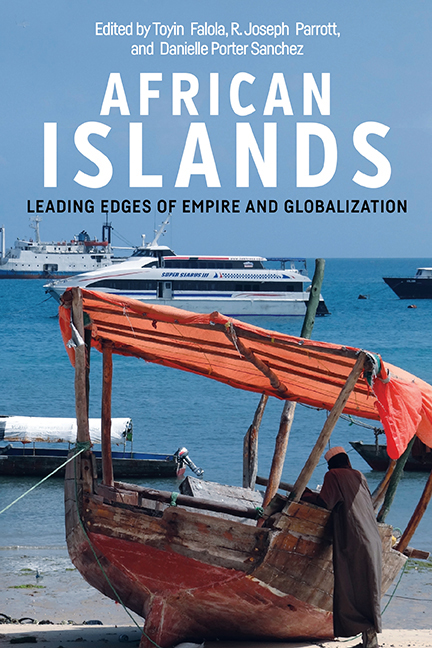Book contents
- Frontmatter
- Dedication
- Contents
- Introduction: Arbiters and Witnesses of Change: Contextualizing Conversations on African Islands
- Part 1 Atlantic Ocean Islands
- Part 2 Indian Ocean Islands
- 8 Africa's Indian Ocean Islands, Near and Distant
- 9 Monsoon Metropolis: Migration, Mobility, and Mediation in the Western Indian Ocean
- 10 The Mascarenes, Indian Ocean Africa, and Global Labor Migration during the Eighteenth and Nineteenth Centuries
- 11 The Island as Nexus: Zanzibar in the Nineteenth Century
- 12 Slavery and Postslavery in Madagascar: An Overview
- 13 The Comoros: Strategies of Islandness in the Indian Ocean
- 14 Gendered Pioneers from Mayotte: An Ethnographic Perspective on Travel and Transformation in the Western Indian Ocean
- Notes on Contributors
- Index
11 - The Island as Nexus: Zanzibar in the Nineteenth Century
from Part 2 - Indian Ocean Islands
Published online by Cambridge University Press: 31 August 2019
- Frontmatter
- Dedication
- Contents
- Introduction: Arbiters and Witnesses of Change: Contextualizing Conversations on African Islands
- Part 1 Atlantic Ocean Islands
- Part 2 Indian Ocean Islands
- 8 Africa's Indian Ocean Islands, Near and Distant
- 9 Monsoon Metropolis: Migration, Mobility, and Mediation in the Western Indian Ocean
- 10 The Mascarenes, Indian Ocean Africa, and Global Labor Migration during the Eighteenth and Nineteenth Centuries
- 11 The Island as Nexus: Zanzibar in the Nineteenth Century
- 12 Slavery and Postslavery in Madagascar: An Overview
- 13 The Comoros: Strategies of Islandness in the Indian Ocean
- 14 Gendered Pioneers from Mayotte: An Ethnographic Perspective on Travel and Transformation in the Western Indian Ocean
- Notes on Contributors
- Index
Summary
In April 1840 a 300-ton merchant vessel from the small African island of Zanzibar arrived in New York City. The sultan of Zanzibar and Oman, Sayyid Sa‘īd bin Sultān Āl Busa‘īdī, had dispatched the ship to the United States on an extraordinary mission. Part of Zanzibar's ambitious effort to pioneer more favorable trade relations with overseas partners, the Sultana would be the first ship representing either an African or Arabian state to visit the United States. The voyage of the Sultana captured, in microcosm, East Africa's extraversion in the nineteenth century as well as the rapidly changing social circumstances of the region's great entrepôt.
The Sultana's crew represented Zanzibar's increasing sociocultural diversity and rigid social hierarchy. Onboard were East African domestic slaves and many South Asian sailors. The chief officers, Muhamma d Juma and Muhamma d Abdullah, were Swahili and Persian, respectively. The head of the mission was the secretary to the sultan, Ahmad b in Na'aman. Ahmad bin Na'aman's career was emblematic of Zanzibar's elite at mid-century. Born in Bahrain, Ahmad bin Na'aman studied at an English school in Bombay, took up residence in Zanzibar, made the hajj, and in the service of the sultan traveled to London in 1834.
The Sultana carried gifts to the American president, Martin Van Buren, but diplomacy was not the primary object of its mission. The Sultana sailed to the commercial heart of the Western Hemisphere to conduct business. It delivered to New York the most valued products of the western Indian Ocean region, including dates, ivory, Persian rugs, 11.5 tons of coffee, and the first major shipment of cloves from Zanzibar Island. The ship's return cargo included almost 90,000 yards of American manufactured cloth (merekani in Swahili) and luxury fabrics, as well as thousands of pieces of china, red and white beads, gold leaf, muskets, music boxes, and soap—a product commonly used to wash imported cloth. Such items were typical of Zanzibar's import trade at mid-century, which reflected the consumer tastes of a cross-section of East Africans. China, gold leaf, and broadcloth were used for ornamental and adornment purposes in Zanzibar, while beads and merekani found a large market on the African mainland. Ahmad bin Na'aman was also commissioned to procure luxury items for many of Zanzibar's wealthiest residents, objects such as chandeliers, glass plates, watches, lamps, and mirrors.
- Type
- Chapter
- Information
- African IslandsLeading Edges of Empire and Globalization, pp. 317 - 344Publisher: Boydell & BrewerPrint publication year: 2019

